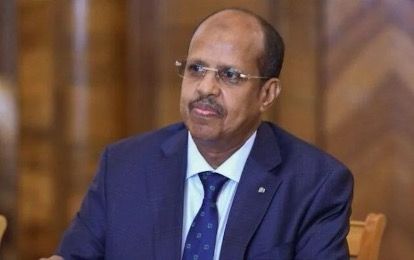Djibouti’s Foreign Minister, Mahmoud Ali Youssouf, has been elected as the Chairperson of the African Union Commission (AUC) for a four-year term following a competitive voting process at the 38th Ordinary Summit of the African Union in Addis Ababa. Youssouf, 59, succeeds Chad’s Moussa Faki, who has led the Commission since 2017.
Algeria’s Ambassador to Ethiopia and Permanent Representative to the AU, Selma Malika Haddadi, has also been elected as the Deputy Chairperson, taking over from Rwanda’s Dr. Monique Nsanzabaganwa.
A Tight Race for AUC Leadership
With the Chairperson position designated for East Africa, the election process was intense. Youssouf secured victory in the seventh round of voting, narrowly surpassing his competitors, Madagascar’s former Foreign Minister Richard Randriamandrato and Kenya’s veteran opposition leader and former Prime Minister Raila Odinga.
Odinga entered the summit as the perceived frontrunner and won the first round of voting. However, Youssouf took the lead from the second round onward after Randriamandrato was eliminated. Haddadi also emerged victorious in the seventh round, defeating North African contenders from Egypt and Morocco for the Deputy Chairperson role.
Election of AUC Commissioners
Before the crucial leadership vote, the summit also conducted elections for AUC Commissioners. Among those re-elected was Nigeria’s Ambassador Bankole Adeoye, who retained his position as Commissioner for Political Affairs, Peace, and Security. Ghana’s Ambassador Amma Twum-Amoah was also re-elected as Commissioner for Health, Humanitarian Affairs, and Social Development. Both officials hail from West Africa.
Youssouf’s Vision for the AU
A seasoned diplomat, Youssouf studied foreign languages in France and later underwent advanced training in business management in the UK and Brussels. Prior to his appointment as Djibouti’s Foreign Minister in 2005, he served as his country’s ambassador to Egypt under three different administrations. In a speech in Rabat, Morocco, last December, Youssouf outlined his priorities for the AUC, stating, “If I am elected, my priority will be financial management and governance. My goal will also be to mobilize internal funds. Djibouti has always been a source of trust and credibility, capable of playing a leading role in promoting stability and security.”
A Continent in Crisis
As Youssouf takes on this leadership role, he faces significant challenges within the organization. The AU is currently grappling with leadership disputes, financial constraints, and a host of security and governance crises. Violent conflicts persist in parts of Somalia, Sudan, South Sudan, the Central African Republic, the Democratic Republic of Congo, Mozambique, and Ethiopia—where the AUC is headquartered. Additionally, six AU member states—Chad, Sudan, Mali, Guinea, Burkina Faso, and Niger—are currently under military rule following recent coups. The ongoing political instability, economic hardships, terrorism, and climate change further complicate the continent’s trajectory.
AUC’s Role in Africa’s Future
The AUC, which replaced the Organisation of African Unity (OAU) in 2002, is tasked with leading Africa’s economic integration, conflict resolution, and governance reforms. Youssouf’s leadership will be crucial in addressing these pressing issues, navigating internal divisions, and strengthening Africa’s role on the global stage. With high expectations and mounting challenges, the new AUC Chairperson faces a daunting task in steering the organization toward stability, economic growth, and greater continental unity.
Story by Frontpage Africa






















